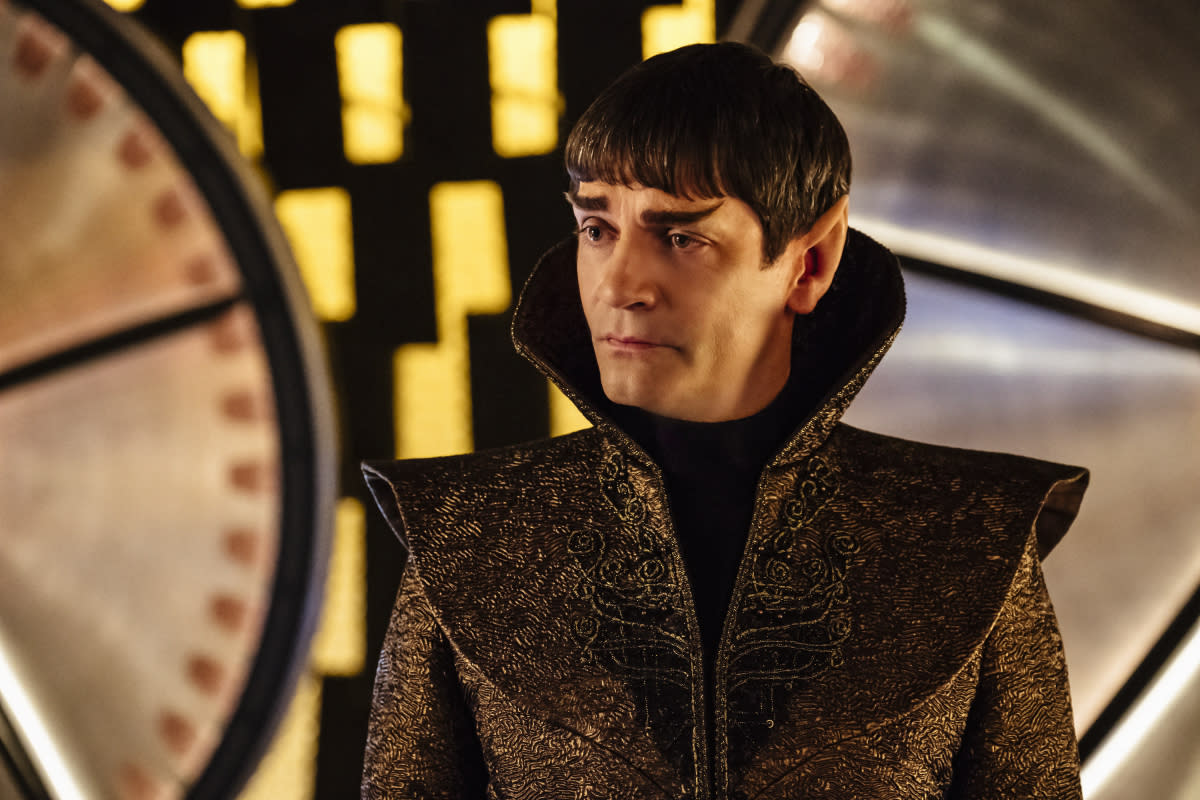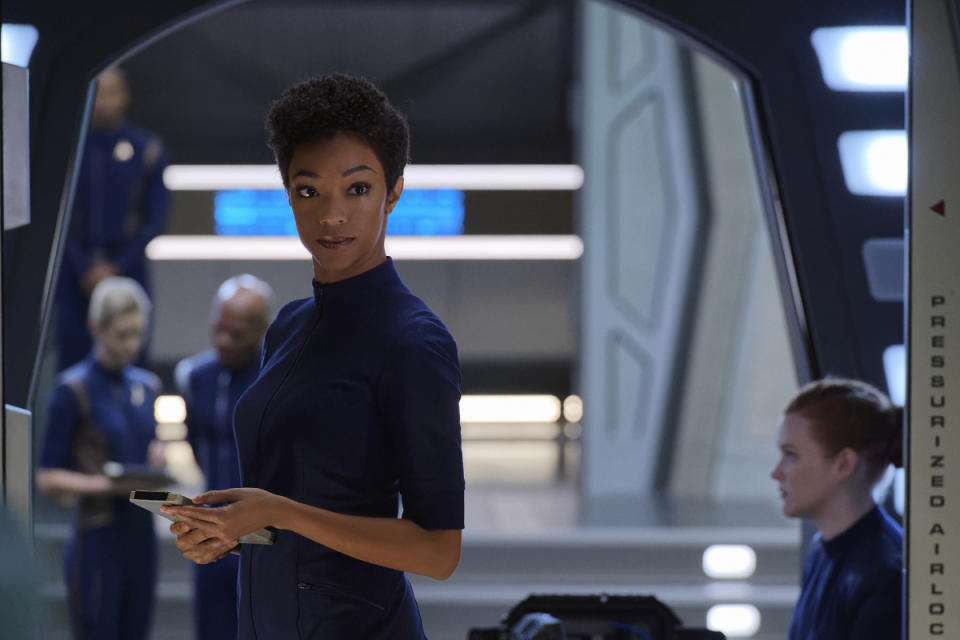'Star Trek: Discovery' postmortem: James Frain on Sarek

Warning: This post contains spoilers for the “Lethe” episode of Star Trek: Discovery.
Star Trek: Discovery has introduced a number of compelling new characters into the future that Gene Roddenberry created five decades ago. But one of the show’s most fascinating personalities has been a Trek mainstay since The Original Series: Sarek, the Vulcan ambassador who sired Spock. And his famous son’s name is referenced for the first time in Discovery’s sixth episode, “Lethe,” when Sarek flashes back to the moment when his Vulcan superiors told him to choose whether his ward, Michael Burnham, or his biological offspring would have a place on the Vulcan Expeditionary Group. His choice in the past has a profound impact on the present, setting Michael on the path to her current place aboard the Discovery and making Sarek a target for those Vulcans who don’t appreciate his interest in humankind.
These are all incidents that retroactively shape the man Sarek becomes in The Original Series onward, when he was played by Mark Lenard. And Discovery actor James Frain appreciated the opportunity to depict how the character becomes the Vulcan that Trekkies remember. “The place where Sarek ends up is very interesting,” Frain tells Yahoo Entertainment. “People change over their lives, and what kind of changes did Sarek go through? What kind of space can we explore around that? I was interested in the intention of the character, not specifically how to match [Lenard’s] performance.”
We spoke with Frain about the similarities he’s seen between Vulcan and samurai society, and why he wants more scenes of Sarek kicking ass.
Yahoo TV: I’ve enjoyed the way the introduction of Michael Burnham into the Trek mythos has impacted Sarek as a character, particularly in regard to his fascination with humans.
James Frain: Right. I mean, to have chosen a human wife is something that’s been a big question. Why? How? Who is this Vulcan who married a human and had Spock? Our story brings in another human being, and that causes all kinds of problems for him. It causes him to become a terrorist target, which is interesting because terrorism is founded on extreme unbridled passion, and yet Vulcans claim to be fighting for logic. That’s interesting ground we start to explore in this episode.
We haven’t seen Vulcan society fracture to a point where employing a suicide bomber seems like a logical choice for one faction.
It’s a great metaphor for how we rationalize things that aren’t rational, and justify things that aren’t justifiable. The whole Vulcan approach is worth exploring that way. I find myself thinking about Japanese samurai, which was also a very coded and ordered society. Even if you had someone who was progressive in their ideology, they’re still a samurai — they’re not going to become a hippie! So it’s about finding space in that very structured society to say, “We have to move forward and evolve. The rest of the universe already has.”
I’m struck by the fact that the two women Sarek is closest to are both human. There are some interesting gender dynamics at play there that I hope to see explored.
Yes, and how does that contrast with the father he is to Spock? That’s something a lot of parents struggle with. They connect with their daughter but not their son, or they connect with their son but not their daughter. And that’s due to whatever obstacle they have in themselves that they can’t get past. A distant father is a very familiar experience for people, and I think it’s one of the things we’re exploring with Sarek. He has all these ideals and behaviors, but ultimately can he really be what is required of him by Michael and Spock?
In your mind, is he trying to be the ideal Vulcan man for his wife and ward in the same way that some men feel compelled to be an alpha male in the company of women?
That’s a really good question. I’ll use that, thanks. I’ll bring it to the next rehearsal. [Laughs] I think that revolves around how self-reflective he is, and I suspect that there is a gap between who he would like to be and who he is. As there is in all of our lives! What is the ideal Vulcan father? That’s part of what’s behind his choice [between Spock and Michael]; he’s called to task and is told he has to fall in line. They kind of set him up to get rid of Michael essentially. I think he also feels that he failed her in this relationship and in the way he brought her up. So he brought her to Captain Georgiou as a way of saying, “This is your world. This is a captain I trust, and this is an environment in which you can truly thrive. I can’t be what you need, but I can provide this for you.” And her perfectly reasonable question to that is, “Why didn’t you just tell me?” He doesn’t have an answer for that.

Because that would mean acknowledging a feeling of shame.
She does get him to admit that in the episode. But then at the end of it, he’s like, “I don’t remember anything.”
From a performance standpoint, how do you allow those hints of emotion to show through without unleashing it full force?
It’s hard for me to judge sometimes, because I don’t know how much the audience can see of what’s behind my eyes, as it were. I know what I think needs to happen, but sometimes I feel, “Oh my God, I’m wildly over the top!” It’s not, but your register of what is expressive is very different in this character. I try for the heart [of what he’s feeling] and then how he covers that up, but I’m always gauging how much is expressed and how much should the audience see.
Let’s talk about Sarek and Michael’s fight scene. What sort of preparation was required for that moment?
The stunt guys on the show have developed fighting styles for specific characters, so this was a very structured and kind of ornate style. They devised the fight with that in mind; it needed to be very clear and not modulated by any kind of rage or pain, just pure technique. I loved it! I was like, “When do we do some more? Sarek is kicking ass!” [Laughs] But he’s not, because she wins! And that’s interesting too. This fight is a symbolic fight — it’s not a real fight they’re having. She’s trying to get into his mind, and it’s being physicalized in this way. It’s more about her trying to break down his armor despite the fact that he has these years ahead of her in terms of training and discipline. Can she beat him on sheer will and desire and passion? And it turns out she can. It’s a metaphor for reaching into his soul, as it were.
We hear Spock’s name for the first time in this episode. My mental image of the character is always Leonard Nimoy. How do you picture him in your own mind?
He’s a teenage Spock, and I have an image of what the teenage Spock is like. There’s some friction and resentment there from Sarek about Spock, and that’s very interesting. I just imagine a teenage version of Leonard Nimoy, maybe with a little shaving fuzz and breaking voice. [Laughs]
Star Trek: Discovery releases new episodes Sundays at 8:30 p.m. on CBS All Access.
Read more from Yahoo Entertainment:


